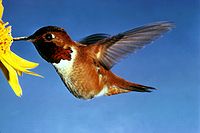
Yeast-nectar interactions: metacommunities and effects on pollinators.
Sign Up to like & getrecommendations! Published in 2020 at "Current opinion in insect science"
DOI: 10.1016/j.cois.2020.09.014
Abstract: About 90% of all flowering plant species are pollinated by animals. Animals are attracted to flowers because they often provide food in the form of nectar and pollen. While floral nectar is assumed to be… read more here.
Keywords: floral nectar; interactions metacommunities; metacommunities effects; yeast nectar ... See more keywords

Nicotine in floral nectar pharmacologically influences bumblebee learning of floral features
Sign Up to like & getrecommendations! Published in 2017 at "Scientific Reports"
DOI: 10.1038/s41598-017-01980-1
Abstract: Many plants defend themselves against herbivores by chemical deterrents in their tissues and the presence of such substances in floral nectar means that pollinators often encounter them when foraging. The effect of such substances on… read more here.
Keywords: floral nectar; nicotine floral; nectar; pharmacologically influences ... See more keywords

Sodium-enriched floral nectar increases pollinator visitation rate and diversity
Sign Up to like & getrecommendations! Published in 2022 at "Biology Letters"
DOI: 10.1098/rsbl.2022.0016
Abstract: Plants have evolved a variety of approaches to attract pollinators, including enriching their nectar with essential nutrients. Because sodium is an essential nutrient for pollinators, and sodium concentration in nectar can vary both within and… read more here.
Keywords: nectar; floral nectar; sodium enriched; pollinator visitation ... See more keywords

Changes in floral nectar are unlikely adaptive responses to pollinator flight sound.
Sign Up to like & getrecommendations! Published in 2020 at "Ecology letters"
DOI: 10.1111/ele.13403
Abstract: Under noiseless experimental conditions, sugar concentration of secreted floral nectar may increase after flower exposure to nearby sounds of pollinator flight (Veits et al. 2019). However, we reject the argument that this represents adaptive plant… read more here.
Keywords: nectar unlikely; floral nectar; changes floral; pollinator flight ... See more keywords

Does acoustic priming 'sweeten the pot' of floral nectar?
Sign Up to like & getrecommendations! Published in 2020 at "Ecology letters"
DOI: 10.1111/ele.13490
Abstract: A recent claim that evening primrose flowers adaptively secrete nectar in response to vibrations from hovering bees lacks supporting evidence. The authors fail to demonstrate that bees can access the concealed nectar and that their… read more here.
Keywords: pot floral; sweeten pot; floral nectar; acoustic priming ... See more keywords

Diversity and distribution of microbial communities in floral nectar of two night-blooming plants of the Sonoran Desert
Sign Up to like & getrecommendations! Published in 2019 at "PLoS ONE"
DOI: 10.1371/journal.pone.0225309
Abstract: Nectar-inhabiting microbes are increasingly appreciated as important components of plant-pollinator interactions. We quantified the incidence, abundance, diversity, and composition of bacterial and fungal communities in floral nectar of two night-blooming plants of the Sonoran Desert… read more here.
Keywords: two night; floral nectar; nectar two; communities floral ... See more keywords

Nectar-dwelling microorganisms and their ecological functions
Sign Up to like & getrecommendations! Published in 2017 at "Acta Ecologica Sinica"
DOI: 10.5846/stxb201510292187
Abstract: Floral nectar,a sweet, aqueous secretion that consists mainly of sugars and to a lesser extent amino acids, is an effective reward that entomophilous plants could provide for their pollinators. Plant⁃pollinator relationships mediated by nectar characteristics… read more here.
Keywords: floral nectar; nectar; dwelling microorganisms; nectar dwelling ... See more keywords